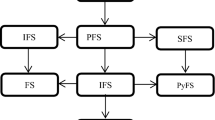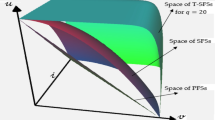Abstract
The framework of T-spherical fuzzy set is a generalization of fuzzy set, intuitionistic fuzzy set and picture fuzzy set having a great potential of dealing with uncertain events with no limitation. A T-spherical fuzzy framework can deal with phenomena of more than yes or no type; for example, consider the scenario of voting where one’s voting interest is not limited to “in favor’’ or “against’’ rather there could be some sort of abstinence or refusal degree also. The objective of this paper is to develop some correlation coefficients for T-spherical fuzzy sets due to the non-applicability of correlations of intuitionistic fuzzy sets and picture fuzzy sets in some certain circumstances. The fitness of new correlation coefficients has been discussed, and their generalization is studied with the help of some results. Clustering and multi-attribute decision-making algorithms have been proposed in the environment of T-spherical fuzzy sets. To demonstrate the viability of proposed algorithms and correlation coefficients, two real-life problems including a clustering problem and a multi-attribute decision-making problem have been solved. A comparative study of the newly presented and pre-existing literature is established showing the superiority of proposed work over the existing theory. Some advantages of new correlation coefficients and drawbacks of the pre-existing work are demonstrated with the help of numerical examples.






Similar content being viewed by others
References
Arora R, Garg H (2018) A robust correlation coefficient measure of dual hesitant fuzzy soft sets and their application in decision making. Eng Appl Artif Intell 72:80–92
Atanassov KT (1986) Intuitionistic fuzzy sets. Fuzzy Sets Syst 20(1):87–96
Bai K, Zhu X, Wang J, Zhang R (2018) Some partitioned Maclaurin symmetric mean based on q-rung orthopair fuzzy information for dealing with multi-attribute group decision making. Symmetry 10(9):383
Couso I, Bustince H (2018) From fuzzy sets to interval-valued and Atanassov intuitionistic fuzzy sets: a unified view of different axiomatic measures. IEEE Trans Fuzzy Syst 9:99. https://doi.org/10.1109/TFUZZ.2018.2855654
Cuong B (2013) Picture fuzzy sets-first results. Part 1. Preprint 03/2013 and Preprint 04/2013. Institute of Mathematics, Hanoi, Vietnam
Dumitrescu D (1977) A definition of an informational energy in fuzzy sets theory. Stud Univ Babes-Bolyai Math 22(2):57–59
Garg H (2016) A novel correlation coefficients between Pythagorean fuzzy sets and its applications to decision-making processes. Int J Intell Syst 31(12):1234–1252
Garg H (2017) Distance and similarity measures for intuitionistic multiplicative preference relation and its applications. Int J Uncertain Quantif 7(2):117–133
Garg H (2018a) Linguistic Pythagorean fuzzy sets and its applications in multiattribute decision-making process. Int J Intell Syst 33(6):1234–1263
Garg H (2018b) Novel correlation coefficients under the intuitionistic multiplicative environment and their applications to decision-making process. J Ind Manag Optim 14:1501–1519
Garg H, Kumar K (2018a) A novel correlation coefficient of intuitionistic fuzzy sets based on the connection number of set pair analysis and its application. Sci Iran E 25:2373–2388
Garg H, Kumar K (2018b) An advanced study on the similarity measures of intuitionistic fuzzy sets based on the set pair analysis theory and their application in decision making. Soft Comput 22(15):4959–4970
Garg H, Kumar K (2018c) Distance measures for connection number sets based on set pair analysis and its applications to decision-making process. Appl Intell 48:3346–3359
Garg H, Rani D (2019) A robust correlation coefficient measure of complex intuitionistic fuzzy sets and their applications in decision-making. Appl Intell 49(2):496–512
Garg H, Munir M, Ullah K, Mahmood T, Jan N (2018) Algorithm for T-spherical fuzzy multi-attribute decision making based on improved interactive aggregation operators. Symmetry 10(12):670
Gerstenkorn T, Mańko J (1991) Correlation of intuitionistic fuzzy sets. Fuzzy Sets Syst 44(1):39–43
Joshi D, Kumar S (2018) (eds) An approach to multi-criteria decision making problems using dice similarity measure for picture fuzzy sets. In: International conference on mathematics and computing. Springer
Kumar K, Garg H (2018a) TOPSIS method based on the connection number of set pair analysis under interval-valued intuitionistic fuzzy set environment. Comput Appl Math 37(2):1319–1329
Kumar K, Garg H (2018b) Connection number of set pair analysis based TOPSIS method on intuitionistic fuzzy sets and their application to decision making. Appl Intell 48(8):2112–2119
Lohani QD, Solanki R, Muhuri PK (2018) Novel adaptive clustering algorithms based on a probabilistic similarity measure over Atanassov intuitionistic fuzzy set. IEEE Trans Fuzzy Syst 26(6):3715–3729
Mahmood T, Ullah K, Jan N, Deli I, Khan Q (2017) Some aggregation operators for bipolar-valued hesitant fuzzy information based on Einstein operational laws. J Eng Appl Sci 36(2):63–72
Mahmood T, Ullah K, Khan Q, Jan N (2018) An approach towards decision making and medical diagnosis problems using the concept of spherical fuzzy sets. Neural Comput Appl. https://doi.org/10.1007/s00521-018-3521-2
Mishra AR, Singh RK, Motwani D (2018) Multi-criteria assessment of cellular mobile telephone service providers using intuitionistic fuzzy WASPAS method with similarity measures. Granul Comput. https://doi.org/10.1007/s41066-018-0114-5
Radhakrishna V, Aljawarneh SA, Kumar PV, Janaki V (2018) A novel fuzzy similarity measure and prevalence estimation approach for similarity profiled temporal association pattern mining. Future Gener Comput Syst 83:582–595
Singh P (2015) Correlation coefficients for picture fuzzy sets. J Intell Fuzzy Syst 28(2):591–604
Ullah K, Mahmood T, Jan N (2018a) Similarity measures for T-spherical fuzzy sets with applications in pattern recognition. Symmetry 10(6):193
Ullah K, Mahmood T, Jan N, Broumi S, Khan Q (2018b) On bipolar-valued hesitant fuzzy sets and their applications in multi-attribute decision making. The Nucleus 55(2):93–101
Wei G (2018) Some similarity measures for picture fuzzy sets and their applications. Iran J Fuzzy Syst 15(1):77–89
Wei G, Gao H (2018) The generalized Dice similarity measures for picture fuzzy sets and their applications. Informatica 29(1):107–124
Wei G, Lu M (2018) Pythagorean fuzzy power aggregation operators in multiple attribute decision making. Int J Intell Syst 33(1):169–186
Wei G, Alsaadi FE, Hayat T, Alsaedi A (2018) Projection models for multiple attribute decision making with picture fuzzy information. Int J Mach Learn Cybernet 9(4):713–719
Xu Z, Chen J, Wu J (2008) Clustering algorithm for intuitionistic fuzzy sets. Inf Sci 178(19):3775–3790
Yager RR (2013) (ed) Pythagorean fuzzy subsets. In: IFSA world congress and NAFIPS annual meeting (IFSA/NAFIPS), 2013 Joint. IEEE
Yager RR (2017) Generalized orthopair fuzzy sets. IEEE Trans Fuzzy Syst 25(5):1222–1230
Zadeh LA (1965) Fuzzy sets. Inf Control 8(3):338–353
Zhang X (2016) A novel approach based on similarity measure for Pythagorean fuzzy multiple criteria group decision making. Int J Intell Syst 31(6):593–611
Acknowledgement
This work was supported by Higher Education Commission (HEC), Pakistan, under National Research Program for Universities (NRPU), Grant. No: 5833/Federal/NRPU/R&D/HEC/2016.
Author information
Authors and Affiliations
Corresponding author
Ethics declarations
Conflict of interest
The authors declare no conflict of interest.
Additional information
Communicated by V. Loia.
Publisher’s Note
Springer Nature remains neutral with regard to jurisdictional claims in published maps and institutional affiliations.
Rights and permissions
About this article
Cite this article
Ullah, K., Garg, H., Mahmood, T. et al. Correlation coefficients for T-spherical fuzzy sets and their applications in clustering and multi-attribute decision making. Soft Comput 24, 1647–1659 (2020). https://doi.org/10.1007/s00500-019-03993-6
Published:
Issue Date:
DOI: https://doi.org/10.1007/s00500-019-03993-6




